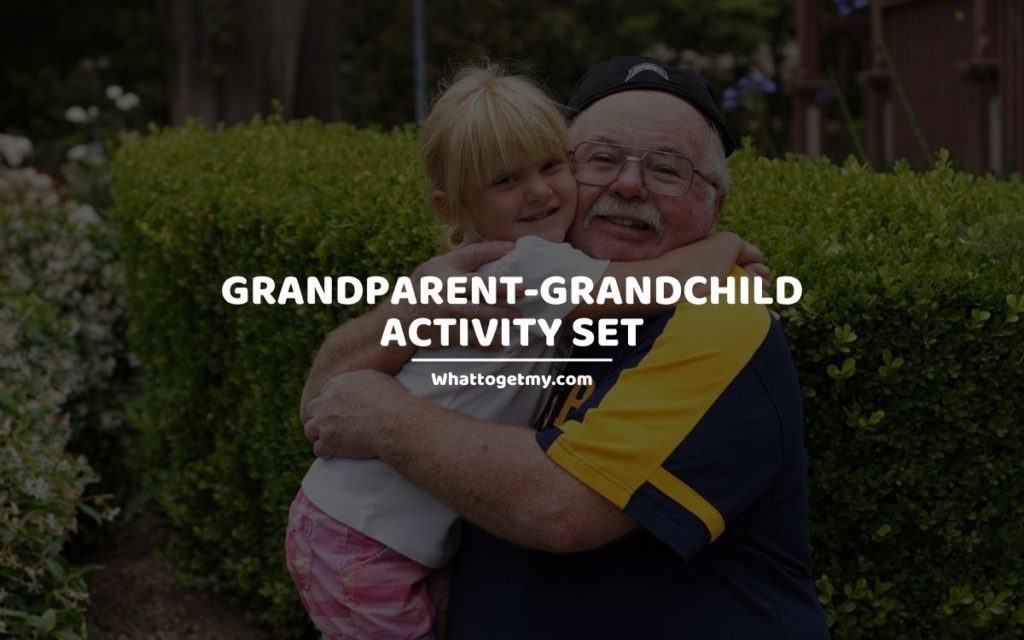Activities for Mentally Disabled Adults
WhatToGetMy Instructional Article
- Helping mentally disabled and physically disabled adults through engaging and fun activities is crucial to their health and well-being. And in this article, you will find such fun and engaging activities for both the mentally disabled and physically disabled adults.
- In this article, you will also get to understand and appreciate the importance of mental health and well-being and why it is important to help mentally disabled and physically disabled adults the best way possible through these fun and engaging activities.
To understand what kind of activities to carry out to help adults living with mental disabilities, one needs to understand what mental disability is, and why it is important to help adults living with mental disabilities the best way one can.
WHAT IS MENTAL DISABILITY?
Mental disability is one of the types of mental disorders that can affect an individual. It is a disability that affects one’s ability to follow the normal process of reasoning and thought. It also affects one’s ability to have a normal social life and psychological interaction with others. It is normally brought about as a result of injury to the brain. Mental disability falls under two broad categories namely psychological disability and cognitive disability.
Psychological mental disability includes Aspergers, anxiety disorders, and schizophrenia amongst others, which affects one’s social and psychological interaction and abilities.
(You may like our related article on Gifts for a Child With Aspergers).
Cognitive mental disability affects the process of reasoning and can be classified into intellectual disability and developmental disability. Autism and cerebral palsy are some examples of mental disabilities.
According to a 2006 survey by the Office of the Assistant Secretary for Planning and Evaluation, a staggering 52% of the section of the population surveyed at that time had both intellectual disability and developmental disability.
(Our article on Gifts For a Teenage Autistic Boy may interest you).
Adults (18+) With Intellectual Disability (ID) and Developmental Disability (DD) in the United States. (2006) Source: Aspe.hhs.gov
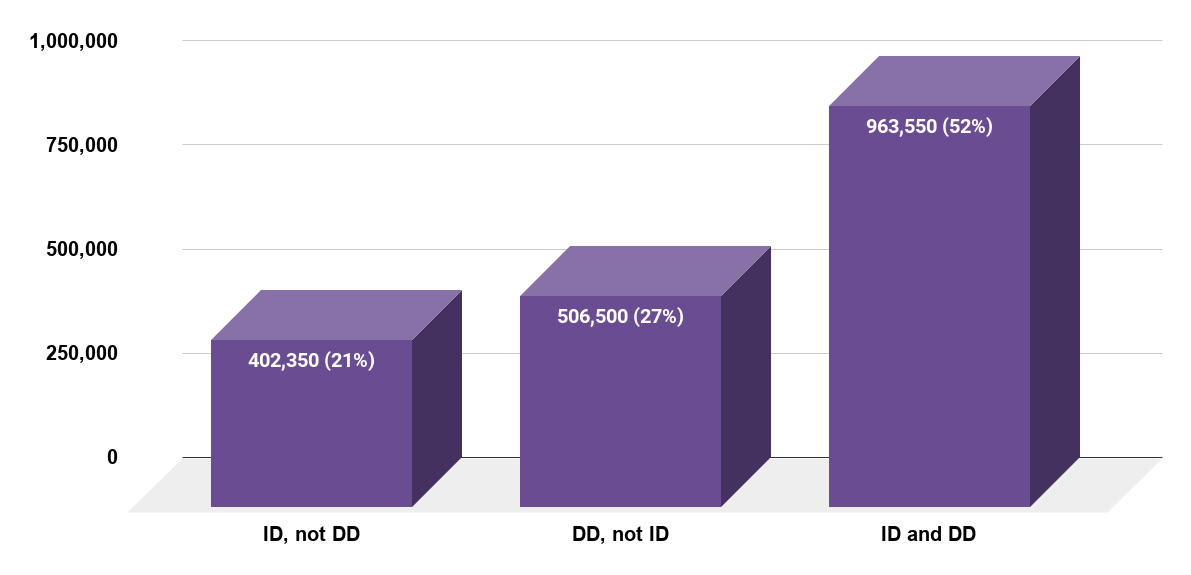
And this means that all around us are people living with intellectual and developmental disabilities, and who need our love and support. After reading this article, you will be able to show such love and support through any of the activities proposed in this article.
Mental disability is however to be distinguished from mental illness which is often brought about by external influences such as stress and anxiety. Mental disability is usually brought about by internal issues that touch directly on the brain. It has been said that while mental illness can be cured over time with the right treatments and therapy, mental disabilities are permanent and cannot be cured but can be appropriately managed for the person to still lead a full and exciting life.
Mental disability is however not a death sentence, and with the right support structure and love, adults living with mental disabilities can lead very full and fruitful lives in society. Classic movies like Forrest Gump for example teach us that this is possible. And in the next sections, you will learn of activities that you can carry out to help persons living with mental disabilities.
IMPORTANCE OF GOOD MENTAL HEALTH.
Good mental health is so fundamental and important to our overall health as individuals. Without the right frame of mind, our physical health is affected, and indeed all aspects of our life are affected. The mind is the powerhouse of the human race. Battles are won in the mind. Defeat starts in the mind. A sense of identity and self-worth starts in the mind and then transcends to every other area of our lives. It is the way we see ourselves and our lives in our mind’s eye that influences the way we carry ourselves and treat others. And this is why we cannot take our mental health for granted, or indeed that of our fellow Americans (and fellow human beings) around us for granted. It is for this reason that principles, like staying and remaining positive and having a positive mindset (even in hard times), are always emphasized.
The mental degradation of one American can affect all of us. And unsurprisingly, a good number of Americans agree according to two surveys carried out in 2019 by the American Psychiatry Association, depicted in the charts below and accessible here and here.
Percentage of U.S. Adults Who Agreed Untreated Mental Illness Has a Significant Negative Impact on the U.S. Economy as of 2019. Source: www.psychiatry.org
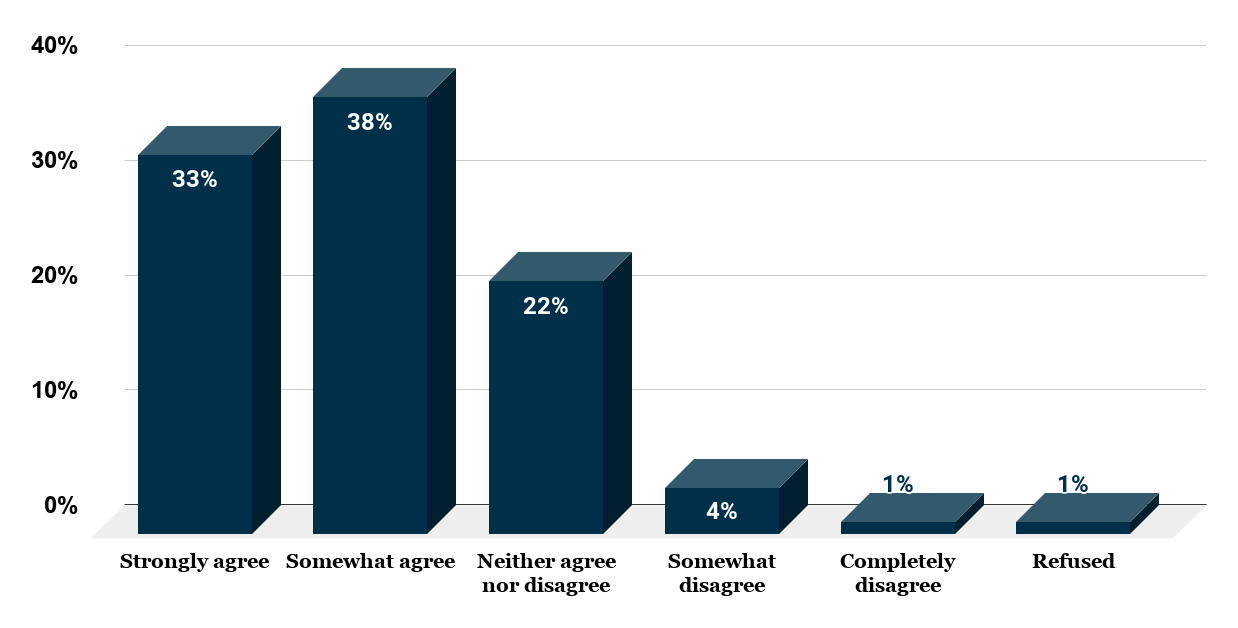
Percentage of U.S. Adults Who Agreed Mental Health Has An Impact On Physical Health as of 2019. Source: www.psychiatry.org
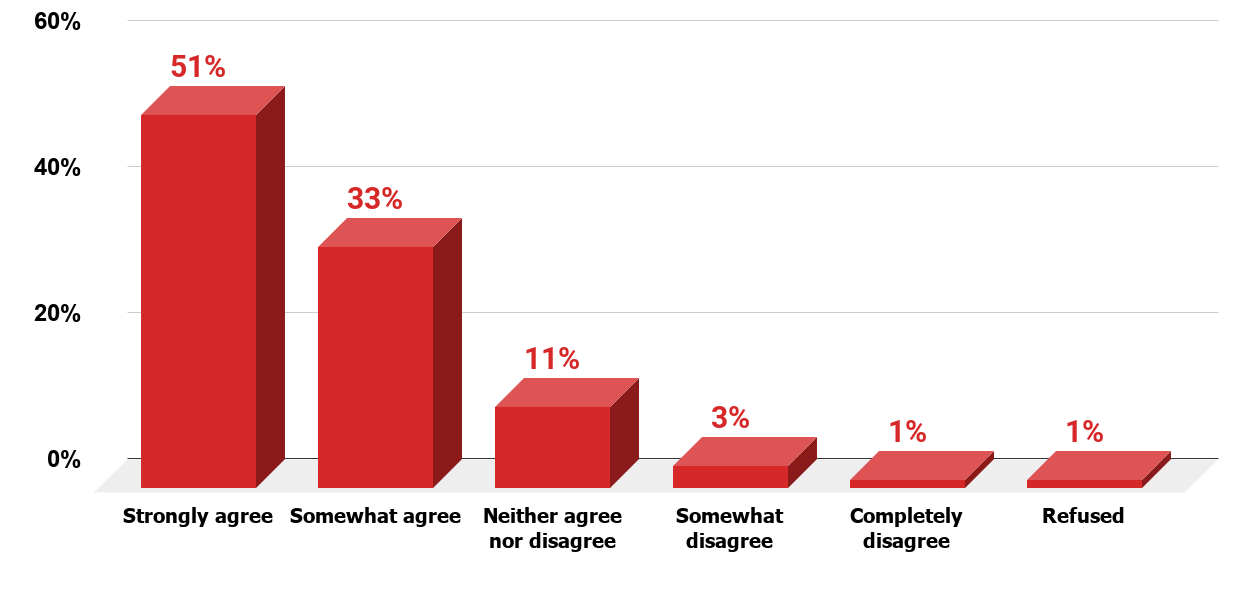
To illustrate this graphically. Imagine an American adult with a mental disorder, say the mental illness of psychosis. And s/he has a psychotic break/episode. This often leads them to cause harm to those around them especially physically and violently. And because of that one person’s mental health, a lot more lives are affected and in most cases lost. But if that one person had received the needed help and the issue of their mental health addressed, those other lives would not have been negatively affected.
We ought to take our mental health and wellness and that of those around us very seriously.
And it is precisely for this reason that adults living with mental disabilities need all the love and support they can. And if you don’t know how to help, this article is here to give you a detailed and helpful list of activities for mentally disabled adults, which will help us in helping our fellow American brothers and sisters who are dealing with mental disability.
MENTAL DISORDER IN AMERICA – THE HARROWING STATS.
And perhaps to paint the final picture of why we need to take this subject seriously, let us show you the alarming stats on the state of mental health and disorder in America. According to the Substance Abuse and Mental Health Services Administration in a 2019 Report, 24.5% of female Americans and 16.3% of male Americans had one mental health challenge or the other that year. Add that to the figures on ID and DD shown above, which would likely have increased since 2006.
Percentage of U.S Adults With Any Mental Challenges In the Past Year As of 2019, By Age and Gender. Source: www.samhsa.gov
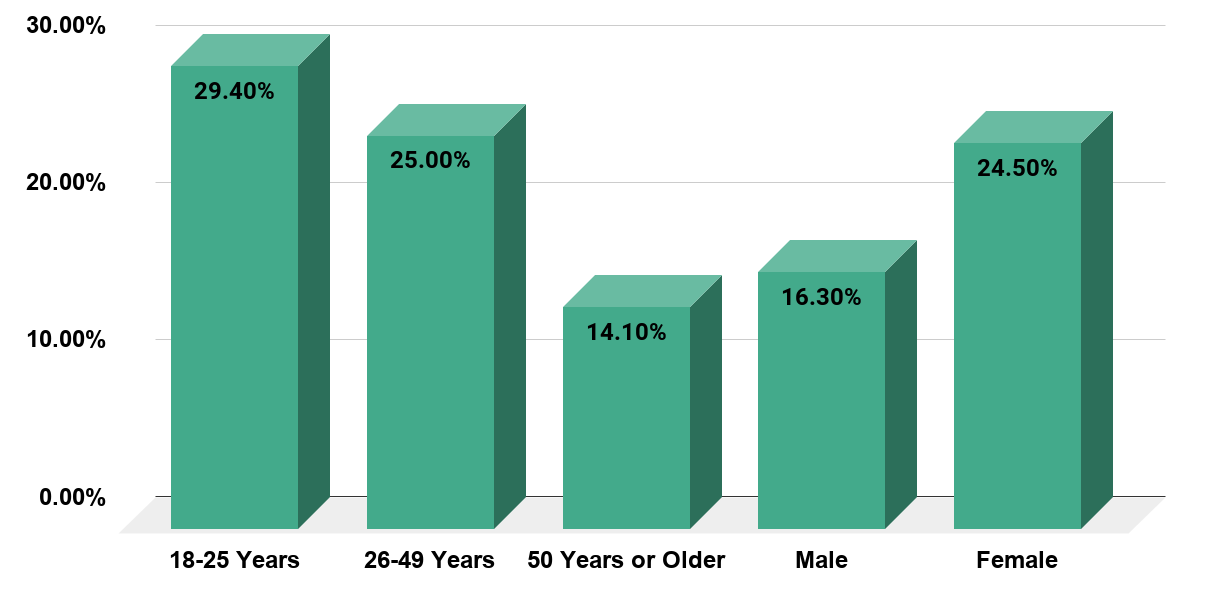
You might look at those percentages and think they are small until it is put in the proper context of just how many Americans out of the total population that translates into. According to Worldometer, the American population currently stands at 331,436,330 at the time of writing. 24.5% of that number is approximately 81,201,900. That is a shocking and very high number of persons affected and who pose a risk to both themselves and the larger society. And this is why, again we emphasize the point, that we cannot take our mental health and those of the people around us for granted.
Where you can help someone with a mental challenge, especially a mental disability, consider helping them. You will be performing a humane and selfless service for the greater good of our society, and importantly you will be helping someone else be the best version of themselves that they are supposed to be.
ACTIVITIES FOR MENTALLY DISABLED ADULTS AND SOME THINGS YOU NEED TO KNOW IN TERMS OF APPROACH.
Now that you have all the facts and figures and reason(s) why our mental health is so important, hopefully, you’ve decided to do something about it in whatever way you can. Remember that no step to help is too small, and every step makes a world of difference in improving both your mental health and that of those around you who may be living with one mental disability or challenge.
When it comes to helping a person living with a mental challenge though, including someone living with a mental disability, you need to know this. Most often they prefer getting help from an expert in the field because they feel more comfortable that the expert will help without judging or putting them down and making them feel even worse than they feel most times. According to a survey by McKinsey in 2018, 35% of Americans preferred to get help for their mental health issues from a psychiatrist and 30% preferred a therapist.
Percentage of Respondents in the U.S. Who Reported Poor Mental Health Who Preferred Help From Select Sources as of 2018, By Source. Source: www.mckinsey.com
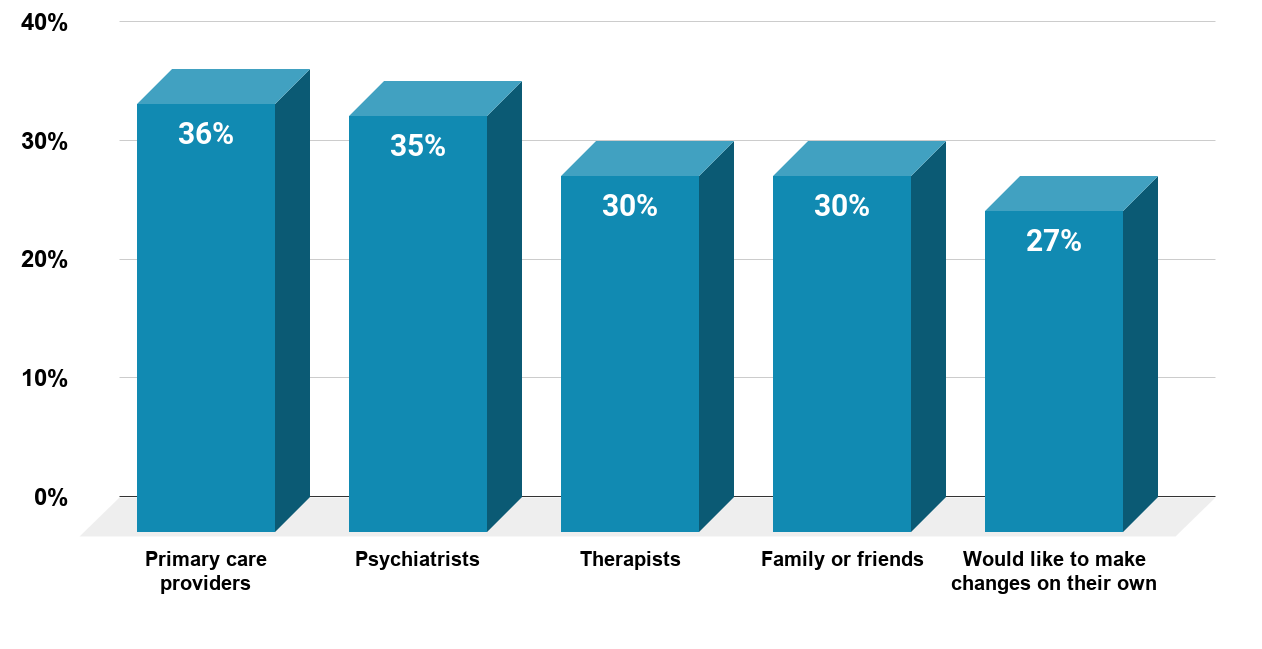
From this stat, it also shows that a good deal of Americans would prefer to get help from their family or friends. And that means you have a part to play and your friend and/or loved one that is living with a mental disability is hopeful that you can help them unreservedly and without judgment.
If your friend or loved one is living with a mental disability, here are some activities and ways you can help them. And remember that your approach is very important. Treat them with love and mutual respect. Don’t put them down or talk down on them or use words or a demeanor that belittles them or make them feel like they are stupid and of no use. You don’t want them feeling like a burden or liability because this will in turn exacerbate the strain on their mind and worsen the challenge they have.
Having said all this, here are useful activities for mentally disabled adults.
Activity Ideas For Intellectually Disabled And Developmentally Disabled Adults.
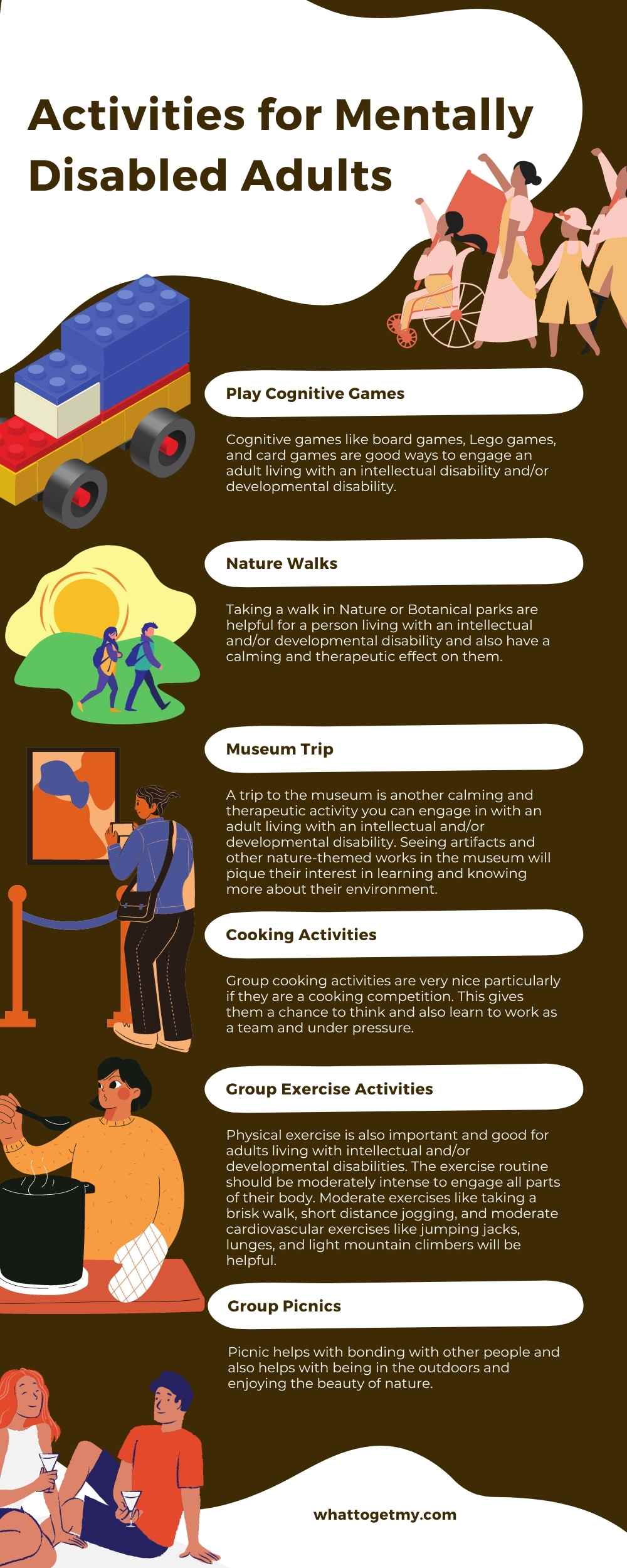
Use this graphic for free, just source us with this link:
Source Link: https://whattogetmy.com/activities-for-mentally-physically-disabled-adults/
Activities for adults with intellectual and developmental disabilities should help engage their cognitive functions more because this is where their challenge lies.
You may also find our article on Activities For 2-Year-Old Autistic Child useful.
The following activities are good cognitive activities for them.
1. Games.
Cognitive games like board games, lego games, and card games are good ways to engage an adult living with an intellectual disability and/or developmental disability. These games engage their thinking and help them think and learn to strategize. They also create thrill and excitement in their brain which is great for their general well-being.
- Board games like Consequences (which is a combination of board and cards), Connect Fours, Charades, and Cranium Cariboo are great board games that an adult living with an intellectual or developmental disability will enjoy. Another good game is Rory’s Story Cubes which will also help them with developing excellent story-telling and writing skills, as well as the Zingo Game.
- Card games like Over The Line (which is a fun combination of Pictionary and charades), UNO, and 52 Essential Conversations Cards are good card games.
- Lego and other puzzle games like it are always fun because they engage one for hours in trying to figure out the puzzle and connect the pieces. There are many Lego games in the market to choose from but you can start with these adult-themed ones – LEGO Architecture New York City, LEGO .F.r.i.e.n.d.s Central Park, LEGO Volkswagen Beetle, and LEGO White House. You can also try out these puzzles – Nice Restaurant Puzzle, Elephants and Animals Puzzle, Ravensburger Cozy Retreat Puzzle, and Balloons At Sunset Puzzle.
And remember that what will make their day is having you play these games with them. Be sure to make out time every once in a while to join them in the excitement of the game.
2. Bowling.
Bowling is a nice fun activity to take them to. Knocking down the bowling pins is an exciting adrenaline game that gets everyone going, including an adult living with an intellectual and/or developmental disability. Patiently show them how it works and once they get the hang of it, they will love it.
3. Nature walks.
Taking a walk in nature/botanical park or by the beach or other natural sites always has a therapeutic and calming effect. These walks are helpful for a person living with an intellectual and/or developmental disability and also have a calming and therapeutic effect on them. You can even decide to have the walk by the beach at night (taking safety measures of course) because the beach is often calmer at night,
4. Going to the Museum.
A trip to the museum is another calming and therapeutic activity you can engage in with an adult living with an intellectual and/or developmental disability. Seeing artifacts and other nature-themed works in the museum will pique their interest in learning and knowing more about their environment.
5. Going to Amusement Park.
Amusement Parks are fun and excitement on steroids. From the roller coaster rides to the water fountain rides, amusement parks always excites and brings out our inner child. You will absolutely thrill and excite an adult living with an intellectual and/or developmental disability with a day out to an amusement park.
Group Activities For Adults With Intellectual Disabilities And Developmental Disabilities.
Group activities are also another great way to stimulate and help adults living with intellectual and developmental disabilities. By encouraging them to be around a group of people and interact and play with them, you make them feel normal and help them with learning how to interact with others. This will also greatly help them develop their social and interpersonal skills even more.
6. Outdoor Group Hikes.
You can organize an outdoor group hike that is a balanced mix of some adults living with intellectual and developmental disabilities and adults who are not living with intellectual and developmental disabilities.
But remember that the friends who are not living with intellectual and developmental disabilities that you invite should be people that are understanding and emotionally mature enough to know how to interact with and relate with your adult friends who are living with intellectual and/or developmental disabilities. You don’t want a group that will make your friend living with an intellectual and/or developmental disability feel less human and shrink further into their shell. This will be detrimental to their mental health and well-being.
If you can’t find such friends, it is better to have the group hike with just other adults living with intellectual and/or developmental disabilities.
To make the hike exciting, you can plan the trail and combine a Scavenger hunt with the hike by placing little items in strategic points on the trail that they should find. It will be fun and exciting.
7. Moderate Group Exercise Activities.
Physical exercise is also important and good for adults living with intellectual and/or developmental disabilities. The exercise routine does not have to be anything too tasking or hectic, but it should be moderately intense to engage all parts of their body.
Moderate exercises like taking a brisk walk, short distance jogging, and moderate cardiovascular exercises like jumping jacks, lunges, and light mountain climbers will be helpful.
Have them do these exercises in a group because being a group with others will motivate them in doing the exercises.
And remember to keep the routine to short times so that they are not overstretched. You can have 5-minute exercises with a minute rest in between for 5 or 6 reps, which comes to 25 to 30 minutes in total. If you can keep this routine for at least two or three times in the week, this will be very helpful and beneficial for them.
8. Group Game Night.
The Games we have identified earlier will be more enjoyable if played with others at Game Night. Game Night is a great avenue to bond with others and has a good time while at it. Having a Group Game Night and playing all those games will get their creative juices flowing and also help them with interacting with other people in a relaxed social setting.
9. Outdoor Group Picnics.
Pack up that picnic bag and go picnicking with a group of adults living with intellectual and/or developmental disabilities. Picnicking helps with bonding and also helps with being in the outdoors and enjoying the beauty of nature. You can also combine a Scavenger Hunt with your picnic for extra doses of fun. You can also set up this GIGGLE N GO Frisbee Outdoor Games for Adults to spice up your picnic outing. Your adult friends living with intellectual and/or developmental disabilities will thank you for this.
10. Group Cooking Activities.
Group cooking activities are very nice particularly if they are a cooking competition. The menu does not have to be something complex or exotic. A simple dish like a hamburger, pasta or noodles, or even baking something simple will still excite your friends living with intellectual and/or developmental disabilities. You can pair them up in groups of twos and threes and have them prepare the dish with the ingredients provided, within a given time. This gives them a chance to think and also learn to work as a team and under pressure.
11. A Group Road Trip.
Road trips are another great bonding exercise that also has a calming and therapeutic effect because of being out in nature and on the road. You can plan for a road trip over 5 days for example where you get to tour different cities and towns around you while making brief stops and exploring what the towns have to offer. This will be a great holiday activity to do with your group of friends living with an intellectual and/or developmental disability. They hardly get the chance to make such road trips and you will make their holiday by giving them that treat.
12. A Group Town Crawl.
Explore all that your town has with your friends/loved ones living with an intellectual and/or developmental disability. It will be a good opportunity to show them around the town and have them learn more about what your town has. You can make it fun by giving them a list of questions about the town that they should have answered by the time the tour is complete. Promise them a reward of say a burger and milkshake or any other treat they really enjoy, to motivate them about looking out for the answers while on the tour. You could divide yourselves into two or three groups and reward the group with the most answers with the largest treat and consolation treats for the other groups.
Sensory Activities For Developmentally Disabled Adults And Intellectually Disabled Adults.
Sensory activities are those activities that engage all our human senses. These activities are very helpful for adults living with intellectual and developmental disabilities because it helps them tap into all their sensors and use them to their full potential. This will in turn sharpen their cognitive skills and make it better.
13. Art and Craft Work.
Arts and crafts are great ways to keep an adult living with an intellectual and/or developmental disability engaged while at the same time enhancing their cognitive skills.
Craft activities like card making, scrapbooking, and art activities like drawing and coloring are great sensory activities for them. Buy them DIY card-making and scrapbooking kits and adult drawing and coloring books. Our article on Gifts for Card-makers, Scrapbookers and Journalers has a good selection of DIY-card making accessories that you can buy for them. You can buy them this 2-Pack Artist Sketchbook and Artist Drawing Pencils Sketch Set to get started on drawing. This Adult Animal Coloring Book is a great coloring book to start them on and which they will love very much.
14. Music and Podcasts.
Listening to music is a good sensory activity that is very good for the soul. It also has a calming and therapeutic effect. Find out if they have any music preferences and fill up an Apple iPod Touch with lots of such music for them. If they don’t have any preferences, classical music and jazz are always a safe option to fall back on, because of their slow rhythm that tends to have a calming effect.
You can also take them for a music concert or festival to enjoy the excitement that comes from watching a live band perform. If they are not comfortable with loud music settings then consider a jazz festival or a classical music concert instead, as they are usually more laid-back.
You can even subscribe to some podcasts that talk on issues they like. Podcasts can be educational and informative. You can subscribe to them on the iPod Touch you bought for them, and be sure to read our article on Gifts for People Who Like Podcasts to find out other things you can buy to get them interested in podcasts.
15. Scavenger Hunts.
Scavenger hunts are amazing sensory activities because they engage so many of our human senses. Place small items in strategic locations and have them find them. It will be very fun and engaging for them.
16. Keeping A Small Garden.
Keeping a small garden is a chance for an adult living with an intellectual and/or developmental disability to care for a living organism. It will give them a sense of responsibility and they will look forward to watering their small garden and watching it grow. You can buy them this Greenhouse Garden Bed to get them started. It is both elevated and movable.
17. Writing.
Writing is the easiest way to express one’s self. A journal makes it easy to write every day if one wants. Writing will allow your friend/loved one living with an intellectual and/or developmental disability to always express themselves even if they don’t always verbalize it. Buy them a good journal preferably a leather-bound journal.
Activities for Adults Living with Cognitive Mental Disabilities.
For adults living with cognitive mental disabilities, it can be a little challenging getting them into large social gatherings and settings because they often serve as bad trigger points for them. It is always best to work with them at their pace. And this means you need to study them and learn what type of things they like and don’t like and what their comfort levels are.
Given their very introverted nature due to their social anxiety, not all the activities in the list above will work for them. From the above list, these are the activities that will work best for them.
- Keeping a small garden.
- Nature walks.
- Arts and crafts.
- Writing.
- Music and podcasts (without concerts).
HELPING ADULTS WITH OTHER DISABILITIES – ACTIVITIES FOR PHYSICALLY DISABLED ADULTS.
Mental disability is not the only disability that affects Americans. There are a host of other disabilities that affect the body and its ability to perform the usual physical functions that it ought to perform. It is for this reason that they are also known as functional disabilities and can range from mobility issues like being bound to a wheelchair, having a leg amputation, or perhaps a broken arm, amongst others.
According to 2018 surveys by the Annual Statistics Compendium and Center For Disease Control and Prevention, at least 13.7% of Americans at the time had a mobility disability. Also, the State of West Virginia had the highest number of persons living with different types of disabilities at the rate of 19.1% and Utah had the lowest rate at 9.6%.
Percentage of People In the U.S. with a disability as of 2018, By State. Source: Disabilitycompendium.org

Percentage of American Adults With Functional Disability Types as of 2018. Source: www.cdc.gov
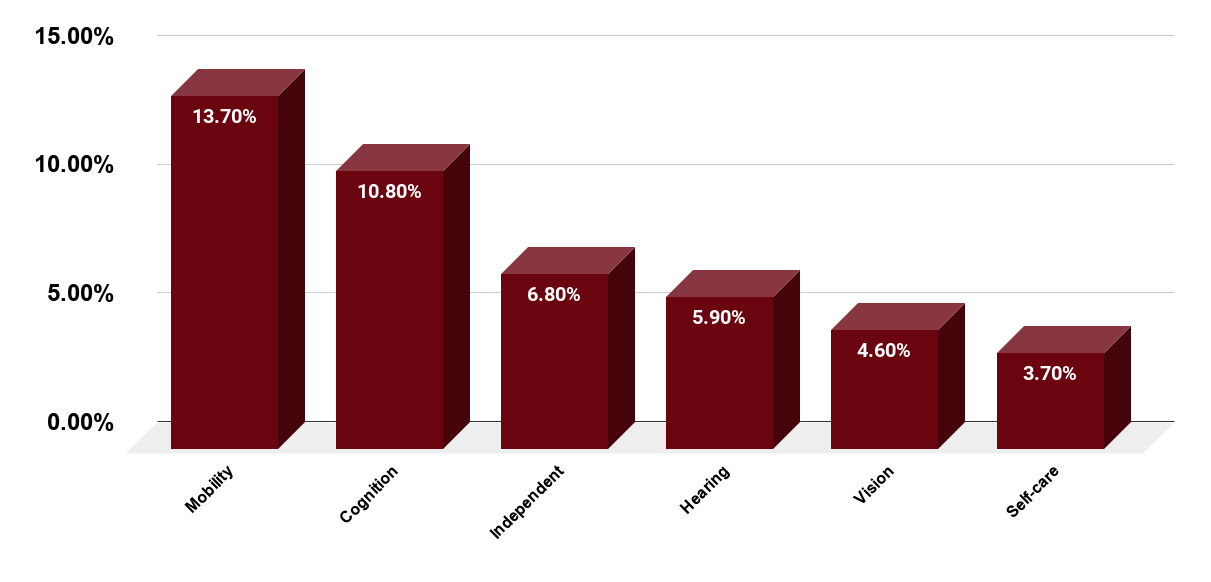
And the effect of this is that there is most likely a person with a disability around you, or you may be directly or indirectly affected as a result of disability in one form or another. And just like mental health and disability, we also need to properly address and help persons living with one disability or another in the best way we can. This is because if not properly dealt with, these can also pose risks to the individuals and affect their mental health, which will in turn affect their overall health and length of life.
A look at these statistical figures from a 2017 survey by the Institute of Disability (and accessed through Statista) shows that a high number of adults living with disabilities (13.1% as of 2016) binge drank. Risky lifestyle behaviors can put them and their family and loved ones at risk.
Percentage of People in the U.S. Who Had a Disability And Binge Drank from 2009 to 2016. Source: www.statista.com
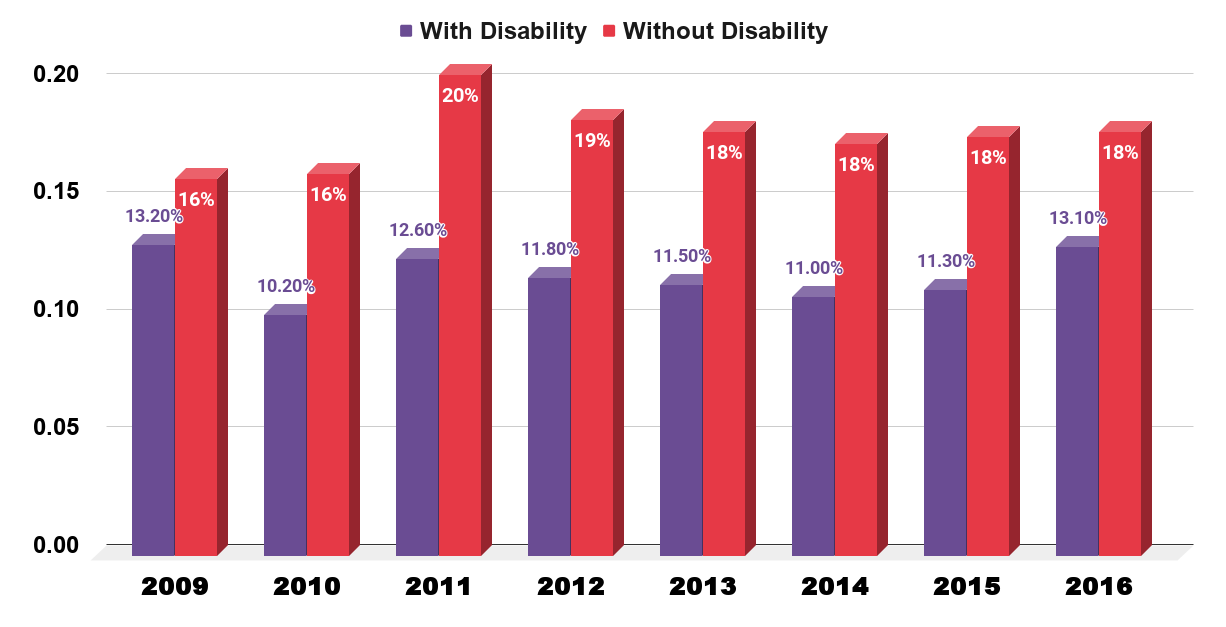
You can help persons living with other disabilities through any of the following activities for adults with disabilities. The best activities are those that keep them engaged and as active as possible, because these help in keeping them stimulated and invigorated. And staying stimulated and invigorated is essential for their health and well-being.
Always remember that a person living with a disability doesn’t want to be treated differently like an outcast. They are not somehow any less of a human being because of the disability they are living with. And so as much as possible, all activities that you can engage in, a person living with a disability should also be engaged in, to the extent that the disability they have allows for.
Fun Activities For Disabled Adults.
Clean fun activities are guaranteed ways to help an adult living with a disability to enjoy life and always see the bright and sunny side of life. Good fun activities get creative juices flowing and this is no different for a person living with a physical disability. We cover some of these fun activities in our articles on fun things to do with someone in a wheelchair and fun things to do when bedridden, and it will be useful to check them out.
Here are some other fun activities for disabled adults that you can have with an adult living with a disability.
1. Bowling.
Persons living with physical disabilities can still participate in a game of bowling even if they are wheelchair-bound. The only persons who may not be able to participate in a game of bowling will be persons with a disability on their hands and with a vision disability/blind.
2. Wheel-chair basketball or table tennis or racing.
Some community centers offer wheel-chair basketball and table-tennis games for those who are confined to the wheel-chair. Find out if there is a community center around you that has such a facility and organize one for your friends with limited mobility. It is fun and a good adrenaline pumping activity that they will enjoy. You can also organize a sort of Paralympics race for your friends who are wheel-chair bound or have other forms of physical disability. They’ll love it.
3. Scavenger hunts.
Everyone loves a Scavenger Hunt because it brings out our inner child and persons living with physical disabilities are no different. Organize a Scavenger Hunt and bring the fun game on.
4. Nature walks.
Take your friend/loved one on a walk in the park or by the beach. These walks always have a calming and therapeutic effect.
5. Games Night.
Everyone loves Game Night. It is a time to let down your hair and have fun and goof about too if you want. Bring all your favorite games listed in this article and have a night of fun with your friend/loved ones living with a physical disability.
Crafts For Adults With Disabilities.
Arts and crafts are another great way to stimulate the mind of a person living with a disability. And since arts and crafts mainly engage the hands, this can be done at any time and anywhere. If the disability is a vision disability or affects their hands, some of these arts and crafts activities can be adapted to also work for them and we will show you how.
6. Knitting and/or Crocheting.
Knitting and/or crocheting is a good craft for a person living with a physical disability. It will keep them engaged and they will be thrilled when they eventually get to finish that sweater or socks. Check out our article on Gifts for Knitters to find the right knitting and/or crocheting equipment to give them to get started.
7. Card-making, scrapbooking, and journaling.
These are good craft activities for a person living with a disability. Our article on Gifts for Card-makers, Scrapbookers and Journalers has all the gift ideas you will need to buy to encourage them in this art and craft activity.
Other art activities that you can keep them engaged with are drawing, coloring, and music. You can read more about these in the section on Activities for Persons Living With A Mental Disability.
Games For Adults With Disabilities.
Playing games is another good way to keep a person living with a disability very stimulated and engaged. Most games require critical thinking and engage the mind in trying to solve the mystery. This is good for their overall growth and well-being. Here are some games for adults living with disabilities which you can buy for them and play with them.
8. Lego and Puzzle Games.
Any of the LEGO or Puzzle Games listed at the section for adults living with a mental disability will be great for an adult with a physical disability.
9. Board Games.
Board games greatly engage the mind and help in stimulating and encouraging thinking and strategizing. Board games like Chess, Monopoly, Scrabble, Charades, Pictionary, and 30 Seconds are great for persons with physical disabilities.
10. Card Games.
Card games are another favorite with persons with physical disabilities. Any of the card games listed in the section on mentally disabled adults will also be great. You can also add a deck of cards for playing Crazy 8, poker or other favorite card games.
Our article on Gifts for Blind Teenagers and the Visually Impaired contains more games for people living with a vision disability or are blind and would be a useful read.
Day Program Activities For Adults With Disabilities.
Any of the day and group activities listed under the section for mentally disabled adults will make for great day program activities for adults with disabilities.
FREQUENTLY ASKED QUESTIONS.
1. What are some things to do with special needs adults?
Persons living with disabilities are also known as special needs adults and all the activities in this article are meant to be carried out with them.
2. Do you know of some activities for adults to do?
There are many activities for adults to do depending on what the occasion is. However, a discussion of those activities falls outside the remit of this article. You can check out some of our earlier articles such as Generosity activities for adults and Fun things to do with your dog outside for some activity ideas.
3. What about social activities for adults?
There are many social activities for adults and a discussion of these fall outside the scope of this article but our earlier articles such as Fun things to do in a small town with friends, Fun things to do in the rain outside, and How to throw a cheap birthday party for adults may be of some assistance in giving you some ideas.
4. What about indoor group activities for adults?
The indoor group activities listed in this article will be good indoor group activities for adults.
CONCLUSION.
To be able to unreservedly and excitedly help adults living with mental and physical disabilities, the following facts should be appreciated:
- Our collective mental health is important for our collective good as a society. One person’s mental degradation can negatively affect and impact the lives of many others;
- There are many people around us with one mental health issue or the other. And this means that many around us pose a risk, both health and otherwise, to both themselves the larger community around them;
- Adults with physical disabilities without the right support structure can decline into risky behavioral patterns that would in turn affect their mental health and create the risk that comes with poor mental health.
- With the right support structure and love, adults living with mental and physical disabilities can lead full and exciting lives. The disability they live with should not be a death sentence.
- Helping them the best way we can is both a humane and selfless service to humanity and will importantly help them be the superb and healthy person they were always meant to be.
When we help them through all the activities listed in this article, we help them in leading such full and exciting lives that they also deserve.
01 HOUR 38 MINUTES
ESTIMATED TIME DESIGNING AND UPLOADING THIS ARTICLE
16 HOURS 03 MINUTES
ESTIMATED TIME RESEARCHING AND WRITING THIS ARTICLE
You Might Also Like


